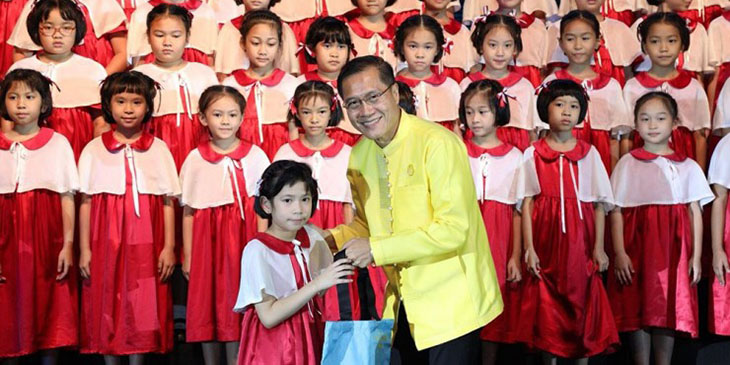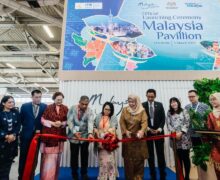Thai Minister flags four points to learn from crises and drive the future of Thai tourism

Thai Minister of Tourism and Sports Mr. Weerasak Kowsurat has identified four points to drive tourism forward in the years ahead and called on the entire industry to sign up to them. The four principles are: 1) Reducing Inequalities and Disparities; 2) Sustainability; 3) Generosity and Kindness; 4) No Compromising on Safety.
Addressing nearly 1,000 members of the Thai tourism industry attending the annual Thailand Tourism Action Plan (TATAP) 2019 at the Queen Sirikit National Convention Centre, Mr. Weerasak said he did not want to use the word “policy” because it would sound too official. Instead, he said, he would like to keep his approach informal and leave it to up to the industry to do the right thing.
He then elaborated on each of the four points:
“Reducing Inequalities and Disparities”: Mr. Weerasak said reducing inequalities and disparities is usually framed within the context of boosting earnings from tourism. However, it is more important to be socially responsible and focus on enhancing earnings in terms of how much honour and respect Thailand can gain. Just being a big economic sector does not necessarily make tourism more powerful. It is more important to be seen as “honourable” than “powerful” because that is what will enhance cooperation and people to people connections.
“Sustainability”: Mr. Weerasak said it is all very well to talk about sustainability. However, it is equally important to focus on quality as in the quality of our work, and attracting quality clients. Sustainability itself is a very sensitive process and must include the social context as well as the fragility of the environment. It also involves legal issues.
He said having only marketing knowledge is not enough because it means merely understanding the customer. “But we first have to understand ourselves and the environment in which we operate. Sustainability involves social, environmental, economic and many other associated factors. So, similar to the effort to reduce inequalities and disparities by enhancing our honour, we first need to enhance our own understanding of sustainability. We have to see the glass as being half full, and always remain open to listening, learning and re-evaluating. It will give us the ability to change, respond, develop, and even lead others.”
“Nam Jai” (Generosity, Kindness): Mr. Weerasak noted that he had just returned from Phuket after overseeing the efforts to facilitate assistance to the victims, as well as their friends and families, of the boat accident. He said he was told that the entire Phuket business community has come together to help, with an offer of 500 rooms from 50 hotels. Thirty vehicles have been deployed to provide free airport transfers. At every assistance centre that he had visited, he found food and Thai-Chinese interpreters on standby.
“That is what you call ‘Nam Jai’,” he said. “No matter which family comes in at what time, whether on an international or domestic route, we will have people to help them and stay with them for as long as required. No one has to pay anyone. This is not a duty. It is not a job, but it is ‘Nam Jai’.”
He said these incidents reminded him of the December 2004 tsunami tragedy, which also caused enormous loss of life and material damage, but was also managed in a spirit of “Nam Jai” of the Thai people. “Nam Jai” is a bond that unites the people, especially in the tourism industry, he stressed.
“No Compromising on safety”: This message must be sent loud and clear. He said that many incidents happen. “Although nobody wants them to happen, but we must have safety and management procedures in place, and leave no room for compromise. I think it will change the role and the power of our marketing communications. If we become known as a country that does not compromise on safety, it will become another plus point for us to be recognised for not being “lax” in our standards.”
He said Prime Minister Gen Prayut Chan-ocha had also visited the families of the Phuket boat accident and, after listening to all the stakeholders, instructed the Minister of Tourism and Sports to upgrade tourist safety and security standards nationwide.
“I think this is an opportunity for us to adopt new standards. We will learn in order to be consistent. It will allow us to ascend the steps of “safety”.
The Minister said that over the past many years, Thailand had enjoyed enormous quantitative growth in tourism and was now ready to focus on quality.
He concluded, “Today I call on you to join the effort to reduce inequalities and disparities by enhancing our honour. Being more honourable will attract more cooperation from both domestic and international partners to work constructively with us.
“Let’s do it in a sustainable way. In future, more people will be entering our workforce and robots, robotics and automation will change the way we live and work. But we will always need people, and we have to set standards for them to follow. At the same time, we must appreciate the value of diversity and sustainability.”
He said many foreign journalists had asked whether the events in Chiang Rai and Phuket will affect Thai tourism. “I will not be so arrogant as to claim that it does not affect. But I say it depends on how we can manage these crises and learn from them.”
source: Travel Daily News





